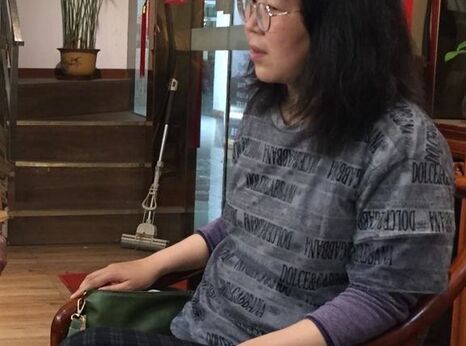China: Covid-19 journalist hospitalized, grave concerns

Zhang Zhan, a former lawyer, is a citizen journalist who has actively spoken out about politics and human rights issues in China. In February 2020, she travelled to Wuhan, then the centre of the Covid-19 outbreak in China. She used online platforms (including WeChat, Twitter and YouTube) to report on the detention of other independent reporters as well as the harassment of victims’ families. Zhang Zhan went missing on 14 May in Wuhan and was subsequently revealed to have been detained by police in Shanghai, more than 640 km away.
Zhang Zhan started a hunger strike in June 2020 to protest her detention and assert her innocence. Despite her intention to continue with her protest, detention centre authorities reportedly began forcibly feeding her through a feeding tube, and it is reported that her cellmates were also involved in the act of forcibly feeding her. Zhang’s defence lawyer said she is physically very weak and suffering from stomach pain, dizziness and weakness while walking. It is also reported that Zhang Zhan was forced to wear shackles and that her hands were restrained 24 hours a day for more than three months as punishment for her hunger strike.
The Pudong New District People’s Court sentenced Zhang Zhan to four years in prison on 28 December 2020. The charge against her of “picking quarrels and provoking trouble” stemmed from her Covid-19 reports. In April 2021, Zhang Zhan’s family received notification that Zhang was transferred to Shanghai Women’s Prison. Zhang Zhan has continued to carry out a partial hunger strike since being transferred to prison, eating only light snack such as biscuits or mantou (small, steamed buns).
Zhang Zhan was able to speak to her mother on 2 August for the first time since February 2021. Zhang’s mother urged Zhang to reconsider the partial hunger strike in the two calls they had. However, despite the grave risk to her health, Zhang Zhan remains determined to continue the action as a way to assert her innocence and protest her sentence. To date, all requests from Zhang’s family to visit her have been refused without any reason being provided.
Citizen journalists were the primary, if not the only, source of uncensored and first-hand information about the Covid-19 outbreak in China. There are not many citizen journalists in China, as they are not able to obtain official accreditation to report news. Citizen journalists in China face consistent harassment and repression for reporting news and disseminating information that is censored by the government.
There have been many reports of independent journalists and activists harassed by authorities for sharing information about Covid-19 on social media. These include outspoken lawyer and citizen journalist Chen Qiushi, who reported being harassed by the authorities after posting footage from hospitals in Wuhan, and Wuhan resident Fang Bin, who was briefly taken away by the authorities after posting a video purporting to show corpses of COVID-19 victims.
The crime of “picking quarrels and provoking trouble” (寻衅滋事罪) under Article 293 of the Chinese Criminal Law is a broadly defined and vaguely worded offence that has been widely used to target activists and human rights defenders. Although the crime originally applied to acts that disrupted order in public places, the scope has expanded since 2013 to include online space as well. Anyone convicted could face a maximum of five years in prison.